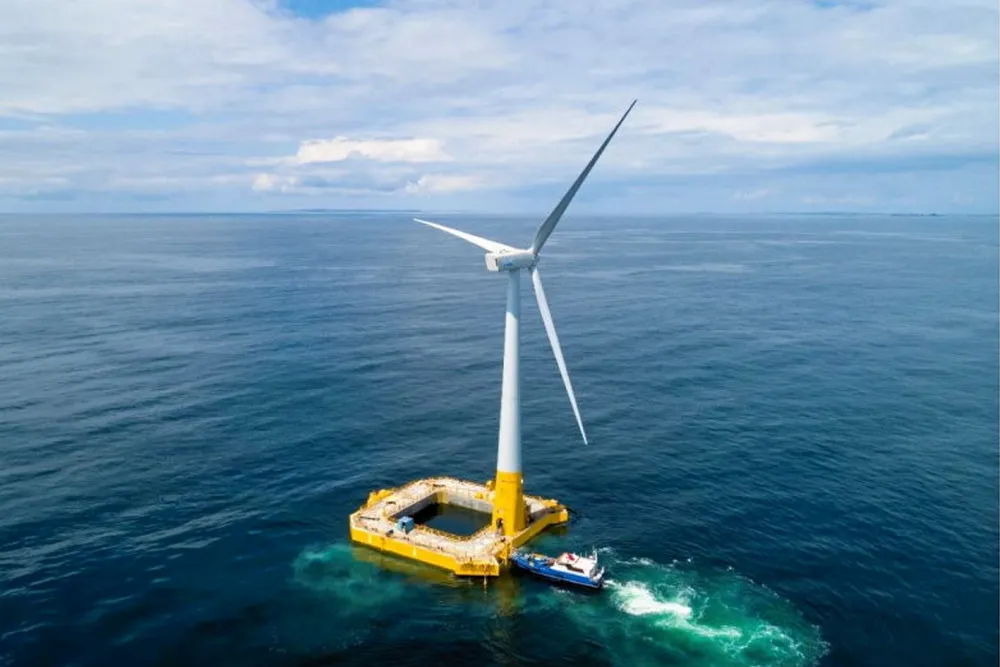France backs EDF and BW Ideol bid to shift floating wind heavy maintenance offshore
Developer and platform specialist among backers of project aimed at easing major bottleneck for developers

French energy titan EDF Renewables and floating wind specialist BW Ideol have been granted funding for a research and development project that could allow replacement of major turbine components offshore, potentially slashing project costs for project developers.
A €2.9m ($3.1m) grant was awarded this week through ADEME, a state-owned financier of innovative infrastructure projects, in response to a call for projects under the auspices of France 2030, a national investment plan.
The project, called BATSO, has been led by BW Ideol a leading developer of floating wind technology based in the former shipbuilding French town of La Ciotat, near Marseille. It aims to address a potentially huge for bottleneck for floating wind developers by facilitating the replacement of major wind turbine components in an offshore environment.
The methods and tools under study are intended to be less costly and more environmentally sustainable than existing options where replacement of major components in a floating offshore wind turbine (FOWT) requires towing the turbines to port.
Operations requiring tow-to-port involve first disconnecting the FOTW from moorings and cable systems, then, once components are replaced, towing the turbine back to the location and reconnecting.
These existing solutions require access to high-powered specialised vessels such as anchor handlers, pushing up costs and greenhouse gas emissions. A shortage of such vessels can result in additional delays and downtime.
The BATSO project aims to reduce the costs associated with the maintenance of floating wind turbines by developing tools and methods to allow replacement of the components directly at sea.
To achieve this, the BATSO project looks towards a technology already used in onshore wind energy, where a crane is mounted on the nacelle, guiding along the tower.
The project has the ultimate objective of making floating wind more competitive in terms of levelised cost of energy (LCOE).
Offshore operations are also intended to help reduce the environmental impact of floating turbines compared to maintenance solutions requiring towing to port.
Described as "the result of three years", the BATSO project brings together several industrial and academic players.
BW Ideol is designer and builder of the Damping Pool floating technology, while EDF Renewables brings its global clout as a project developer and offshore wind farm operator.
Also involved are the Centrale Nantes engineering school, responsible for basin testing and designing cable robot system models, and OPEN-C Foundation, responsible for offshore testing and operating the proposed test site.
“Addressing the challenges of heavy maintenance for offshore wind turbines is crucial for establishing a robust floating wind sector in France," commented Paul de la Guérivière, co-founder and CEO of BW Ideol.
"These new maintenance products and services, which are less costly and more environmentally friendly, can be deployed in the floating wind market at pilot and pre-commercial farms by 2027, and at commercial farms by 2030. We will make our Floatgen turbine, whose lifespan has been extended by an additional five years, available to accommodate such research & development projects.”
Aymeric Ducrocq, director of marine renewable energies at EDF Renewables, added: "Conducting heavy maintenance operations at sea is a key challenge for the competitiveness of floating wind energy. This project will contribute to enhancing the reliability of operations that have not yet been performed at sea, leveraging the expertise of EDF Renewables for its success.
"It also highlights the importance of having demonstrators for future industries in France. The availability of Floatgen is crucial for demonstrating these complex operations under real conditions," added .
(Copyright)